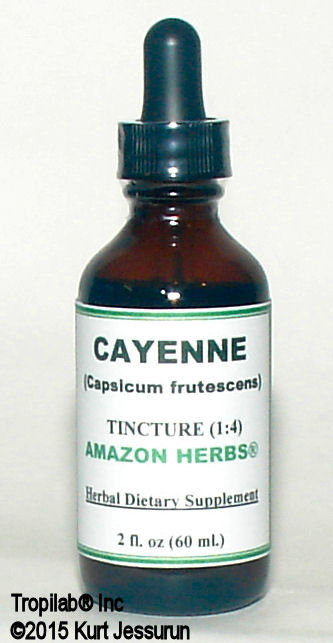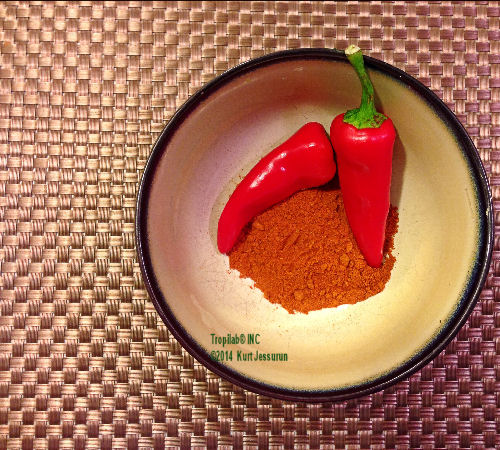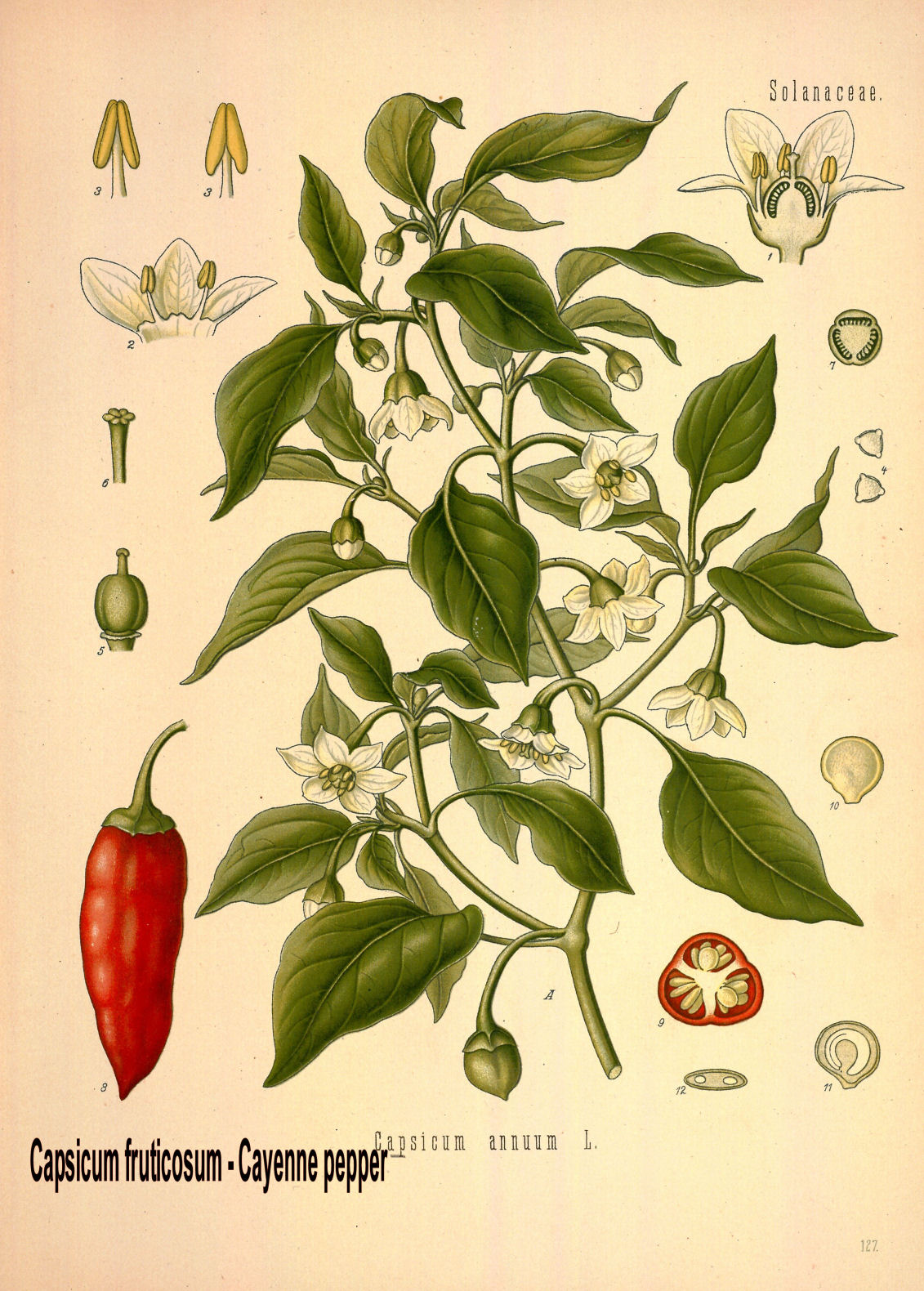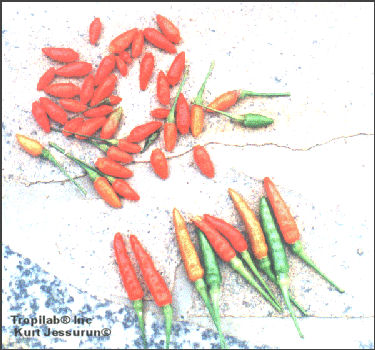 Overview & Applications
Overview & Applications
Cayenne pepper (Capsicum fruticosum), is a small tropical plant or shrub from
which the fruit is used for culinary- and many medicinal purposes.
It has been used for health benefits for thousands of years in Traditional Chinese and Ayurvedic Medicine.
Taken orally, capsicum as support and a remedy increases peripheral circulation and improves digestion. Cultures
that consume cayenne pepper regularly, have a lower incidence of stroke due to an increase in fibrinolytic activity (process
that prevents blood clots from growing and becoming problematic).
Capsaicin (phyto-chemical compound in Chili peppers) is present in large quantities in the seeds and fruits. The potent,
hot fruit and seeds have been used as a Traditional Medicine for centuries. It is considered helpful by herbalists
for conditions of the gastrointestinal tract, such as stomach aches, cramping pains, and gas. It is also frequently used to
manage diseases of the circulatory system. Rubbed on the skin, as a cream; it is a traditional, as well as modern,
remedy for rheumatic pains and arthritis due to what is termed a "counter-irritant effect" (a chemical that causes
irritation to a tissue when applied, thus distracting from the original irritation).
Used against psoriasis (virus disorder affecting the skin and joints; it commonly causes red scaly patches to appear
on the skin).
Cayenne is also adequate against post-herpetic neuralgia caused by shingles (herpes zoster).
 * Cardiovascular support; cleans the blood and stimulates the entire system. Helps clear blockages
from arteries, veins and the lymphatic system. Also halts bleeding and dissolves blood clots.
* Cardiovascular support; cleans the blood and stimulates the entire system. Helps clear blockages
from arteries, veins and the lymphatic system. Also halts bleeding and dissolves blood clots.
It is great in improving circulation; this is the best herb that increases the blood flow; very adequate against
Peripheral Arterial Disease (PAD).
* Improves brain function; one of the most well-known effects is that of increasing blood circulation to the
head- and brain area. Adequate against cluster and migraine headaches
* Can halt bleeding extremely fast, immediately flush the wound with the tincture (1 - 5 full droppers)
after this, pack the wound with Cayenne powder.
*Reduces or halt bleeding from stomach ulcers. When taken internally, it stimulates circulation.
Used against indigestion and heartburn.
* Improves circulation, and reduces or halt bleeding from stomach ulcers. When taken internally, it stimulates
circulation. Used against indigestion and heartburn.
* Is also an effective natural blood thinner.
* Breaks up congestion and speeds healing of colds and flu.
* Used as a diaphoretic (sweat inducing-herb)
* Helps lower cholesterol and avoid blood clots: thins the blood (reduces platelet stickiness) and handles the heart
after a heart attack.
* Alleviate sore throats and tonsillitis
* Provides far more natural vitamin C complex than citrus fruits, and is one of the highest sources available for this
vitamin.
* Used for palpitations and cardiac arrhythmia (irregular heart beat); works against high or low blood pressure,
elevated cholesterol.
 This is the most powerful Cayenne tincture available! It packs 300,000 heat units (Scoville units*); as Cayenne
contains more heat units, the stronger the therapeutic action.
This is the most powerful Cayenne tincture available! It packs 300,000 heat units (Scoville units*); as Cayenne
contains more heat units, the stronger the therapeutic action.
* The greater the number the hotter the pepper; indicates the amount of capsaicin (a phyto-chemical
compound which stimulates thermo-receptor nerve endings) that is present.
CAYENNE FORTE
CAYENNE FORTE tincture, the same ingredients used but the concentrate ratio is 1:1 meaning 1
part cayenne extract to 1 part menstruum (solvent).
Constituents
Capsaicin (the main capsaicinoid), dihydrocapsaicin, nordihydrocapsaicin,
homodihydrocapsaicin, homocapsaicin , Carotenoids; capsanthin, capsorubin, carotene. Steroidal saponins
(capsicidins, CAY-1, a novel saponin), phenolics (hydroxycinnamic acids and flavonoids), vitamin B6, manganese, niacin, riboflavin,
vitamin A, magnesium, potassium and iron, Vitamins E, vitamin K, vitamin C complex and carotenoids.
Pharmacology
 The American Association for Cancer Research reports studies that suggest that Capsaicin may kill
prostate cancer cells by causing them to undergo apoptosis (a form of programmed cell death in multi-cellular
organisms). The studies showed tumors managed with capsaicin were about one-fifth the size of the untreated tumors.
A study by the University of Nottingham suggests capsaicin is also able to trigger apoptosis in human lung cancer
cells.
The American Association for Cancer Research reports studies that suggest that Capsaicin may kill
prostate cancer cells by causing them to undergo apoptosis (a form of programmed cell death in multi-cellular
organisms). The studies showed tumors managed with capsaicin were about one-fifth the size of the untreated tumors.
A study by the University of Nottingham suggests capsaicin is also able to trigger apoptosis in human lung cancer
cells.
Cayenne (Capsicum) is a general tonic, specific for the circulatory and digestive system. It regulates blood flow and strengthens
the heart, arteries, capillaries and nerves. It improves arterial blood supply to the tissues and toxin removal. It is a
strong circulatory stimulant; it seems to reinforce the action of certain prostaglandins, thereby increasing the flow of
blood through all tissues of the body. Capsaicin is known to mimic the effect of some of the prostaglandins. It desensitizes
the sensory nerve endings to pain stimulation. This is the basis for its use as a local analgesic, and recent research suggests
that cayenne can ease the severe pain of shingles and migraine.
The addition of Capsicum to other herbs and/or drugs makes these quickly reach all tissues, even where there is a poor
circulation.
Helps to halt the spread of prostate cancer; a study at the Los Angeles School of Medicine revealed that capsaicin has the
power to slow the growth of prostate cancer cells and even destroy these.
Cayenne has pain-relieving properties such as low back pain, pain caused by damaged nerves in the feet or legs due to diabetes
(peripheral neuropathy), osteo- and rheumatoid arthritis, pain from fibromyalgia, pain after surgery and mastectomy, and nerve pain
from shingles.
Dosage
Tincture: 5 -30 drops (1/6 - 1 ml) with water, 1 - 2 times daily; it is advisable to take with some food.
Infusion (herbal tea): 2 - 3 times daily. Start with the smallest amount powder possible and then add more
if you can tolerate the heat.
Tincture 1:1: 2 drops each time.
An infusion can be made by pouring a cup (250 ml) of hot water onto ½ - 1 teaspoon of Cayenne powder. Steep
for 15 minutes.
Take 1 - 2 times daily.
Drug interactions
Aspirin may interact with Cayenne.
Cayenne may also increase the absorption of other medications.
It should not be used if people are taking ACE inhibitors or antacids.
Use with caution in ulcers and chronic bowel irritation.
Might increase bleeding during-and after surgery.
Using capsicum along with cocaine might increase the side effects of cocaine.
Reference
1. Sharma PV, Classical Uses of Medicinal Plants, Chaukhambha Bharati Academy, Varanasi, 1996.
2. Fisher C, Painter G. Materia Medica of Western Herbs for the Southern Hemisphere. C Fisher G Painter 1996.
3. Swahn JO. The Lore of Spices Nordbok, 1991.
4. Lad V, Frawley D. Yoga of Herbs, Lotus press, Santa Fe, N.M.,1986.
5. Mills S, Bone K. The Principles and Practice of Phytotherapy. Churchill Livingston 2000.
6. Brinker F. Herb Contraindications and Drug Interactions.3rd Edition. Eclectic Medical Publications, USA, 2001.
7. Surh YJ. Anti-tumor promoting potential of selected spice ingredients with antioxidative and anti-inflammatoryactivities:
a short review.Food Chem Toxicol 2002 Aug;40(8):1091
8. Surh YJ, Lee E, Lee JM. Chemoprotective properties of some pungent ingredients present in red pepper and ginger. Muutat
Res 1998 Jun 18;402(1-2):259-67
9. Chaiyata P, Puttadechakum S, Komindr S. Effect of chili pepper (Capsicum frutescens) ingestion on plasma glucose response
and metabolic rate in Thai women.J Med Assoc Thai. 2003 Sep;86(9):854-60.
10. Zhang J, Nagasaki M, Tanaka Y, Morikawa S. Capsaicin inhibits growth of adult T-cell leukemia cells. Leuk Res. 2003 Mar;27(3):275-83.
11. Martindale, The Extra Pharmacopoeia (3oth ed., 1993).
The Physician's Desk Reference (47th ed., 1993).
Potter's New Cyclopaedia of Botanical Drugs and Preparations, 1988.
12. Encyclopedia of Common Natural Ingredients Used in Food, Drugs and Cosmetics, 1980.
United States Pharmacopeia,
Complete Drug Reference, 1993.
A Modern Herbal (Grieve), 1930.
13. CAY-1, a novel antifungal compound from cayenne pepper. Renault S, De Lucca AJ, Boue S, Bland JM, Vigo CB, Selitrennikoff CP. MycoLogics, Inc., Aurora, Colorado 80010, USA
The above presentation is for informational and educational purposes only.
It is based on
scientific studies (human, animal, or in vitro), clinical experience, or traditional usage.
For many of the conditions
discussed, treatment with prescribed (RX) or over - the - counter medication (OTC) is also available.
Consult your doctor,
practitioner, and/or pharmacist for any health problem and before using dietary supplements or before making any changes
in prescribed medications.
|

